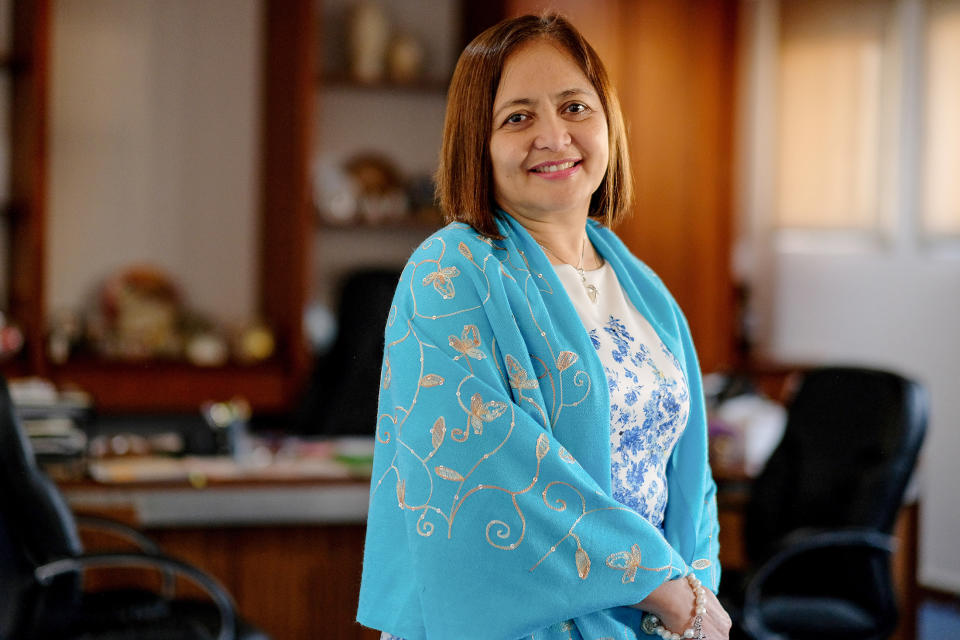Philippine Bank Supervisor Takes Aim at Male-Dominated Boards

By Siegfrid Alegado
The Philippine central bank’s female deputy in charge of supervising the nation’s lenders has a message for their chief executives: Get more women onto your boards.
“Right now, we have a lot of women in big banks, but almost none of them are at the top,” Chuchi Fonacier, 57, said in an interview at her office by Manila Bay. “We encourage diversity.”
The career central banker joins a growing global momentum to break down barriers to gender equality in senior corporate and government roles. In the Philippines, men hold 82 percent of the 265 board seats at the nation’s biggest lenders and some banks have no women on their boards at all, according to the central bank.
“Companies that have more women at the senior management level do better in terms of return to shareholders, profitability,” said Mariam Jaafar, partner and managing director at Boston Consulting Group in Singapore. A BCG survey of 98 companies with the Technical University of Munich last year showed that innovation also increases as the proportion of female managers rises.
Fonacier is one of two female central bank deputies. The other, Cyd Tuaño-Amador was also appointed last year. Fonacier started as a bank auditor in 1984 and took over supervision of the sector last July.
When meeting bank presidents, Fonacier says two of her key requests are to toughen cybersecurity and to put more women in senior roles. “There’s a different approach when women are involved. Women are more intuitive, pay more attention to details and have more patience,” she said.
Balancing boardrooms in Asia is complex because of the breadth of cultural variation. Gender discrimination in Asian workplaces is mostly “unconscious,” according to a study by INSEAD Emerging Markets Institute and Deutsche Bank AG.
In conservative Southeast Asian countries like Malaysia and Indonesia, women face “deep-rooted cultural bias,” Boston Consulting says. Societal norms often pressure women to give up careers to raise a family, producing a gender gap in senior roles. Even in the advanced economy of Singapore, men outnumber women four-to-one on the boards of top banks, the stock exchange’s Diversity Action Committee has said.
In her 34 years at the central bank, in roles that went from counting cash in banks’ vaults to investigating the nation’s biggest financial scams, Fonacier said she had to chart her career differently from male colleagues.
Golf Etiquette
“As a woman in an industry that’s full of men, you have to be factual and stick by the rules,” the deputy governor said. “You can also never arrive at decisions or deals in golf courses or over a bottle of beer. It’s seen as unbecoming of a woman.”
Lack of women in senior company roles means female executives don’t get to socialize as much as their male counterparts, says Cecilia Borromeo, president of the Development Bank of the Philippines, one of three female bank presidents in the country. “That limits my exposure to businesses, and I compensate for that with a lot of reading.”
Deloitte Touche Tohmatsu Ltd. estimates women comprise only 11 percent of all company board directors and 3 percent of CEOs. About 30 percent of the nation’s lawmakers and 25 percent of its ministers are women, according to the World Economic Forum.
Gender bias in the country was highlighted recently after President Rodrigo Duterte told former communist rebels to shoot female comrades in the vagina to make them“useless,” the latest of several gender-based remarks by the country’s leader that have been denounced by women’s and human rights groups. They haven’t dented his popularity: Duterte’s approval rating stood at 80 percent in December, according to a Pulse Asia survey.
Some of the country’s most senior female officials have also come under attack. Maria Lourdes Sereno, the nation’s first female chief justice and an outspoken critic of Duterte’s administration, is facing an impeachment vote by lawmakers on charges including corruption. Sereno, 57, has denied the allegations, calling them politically motivated.
For most women in the country, the path to a senior role means having to manage the pressure of expectations both at work and at home. “A career woman’s expected to be everything,” Fonacier said. “You work harder and have to deliver more, and at the same time you have to attend to your family.”
Sick Child
Shortly before the 1997 Asian financial crisis, the then bank examiner left a sick two-year-old son at a hospital in the care of a nanny after getting a call from her boss to file a report. “I will never forget the disappointment in my son’s eyes as I left him. It’s still fresh in my memory,” Fonacier said.
In the Philippines, authorities want to replicate the progress made in Thailand – where a woman led the central bank from 2006 to 2010 — in increasing the number women in senior financial roles without specific legislation. Nations like Norway have laws on the minimum proportion of women on a company board.
Norway, Sweden and Thailand led a 2016 Oliver Wyman Group ranking of countries with the highest proportion of women on executive committees in financial services – all registering above 30 percent. At the other end of the scale, Japan managed only 2 percent.
“Change is inevitable,” Fonacier said. “Maybe if they see that the one supervising them is a woman, then there’ll be more women in boardrooms.”
To contact the reporter on this story: Siegfrid Alegado in Manila at aalegado1@bloomberg.net
To contact the editors responsible for this story: Linus Chua at lchua@bloomberg.net; Adam Majendie, Karl Lester M. Yap
© 2018 Bloomberg L.P

 Yahoo Finance
Yahoo Finance 